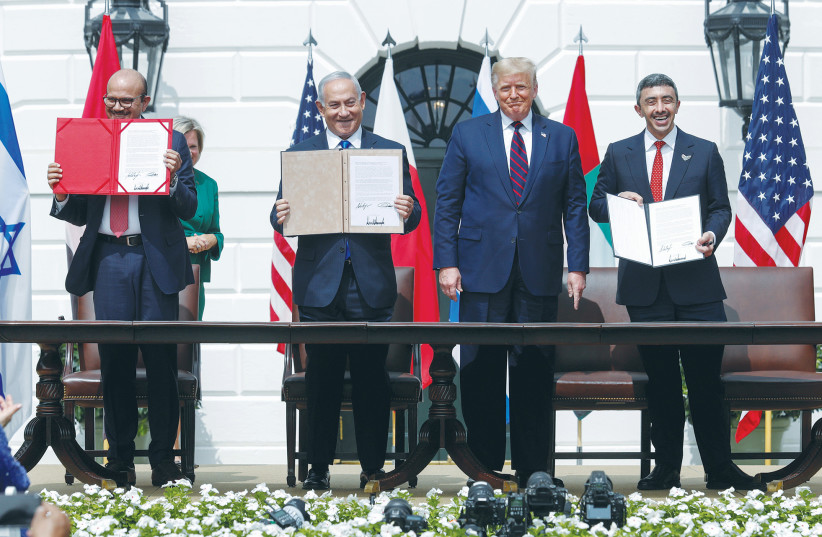International Women’s Day is being marked worldwide to celebrate the social, economic, cultural, and political achievements of women. Alongside this heart-warming celebration, it is notably troublesome that in 2022, we still have to stand for accelerating women’s equality. However, unlike previous years, the world has changed, especially in the Middle East, thanks to the Abraham Accords. This time, the game-changer is undoubtedly diplomacy.
These historic accords created a unique opportunity for dialogue and for sharing best practices on matters of national, regional and global security, empowering women to become players and decision-makers on these issues. They constitute a step forward in the normalization of the relations between Israel and the Arab world.
The agreement is an outcome of a long-lasting process made by diplomats, women, and men together. It shows us that women must be given not only rights and representation, but also the necessary resources to enable their full participation. We all must follow the rules, but it is decisive that women decide over these rules. Women’s voices must be heard and attentively listened to, and their rich experiences should always be considered.
The inclusion of more women in the workforce and all fields of innovation and entrepreneurship means that endless opportunities will grow and prosper due to a new set of creative and innovative solutions.
Creativity is nurtured in diverse groups and out of diverging opinions, creative solutions and dynamic groups are born. Consequently, we need to work for various societies, companies and new academic settings. We must get away from zero-sum thinking. It is important to teach boys and young men what equality and inclusion stand for at early stages in their life. Equal chances never come about in a vacuum, it is about mindset, and both children and their parents must be on board.

As a good practice on this day, it should be recalled that the Israeli Pavilion at Expo 2020 Dubai hosted two special events on women, peace and security last month, initiated by the first Israeli Ministry of Foreign Affairs’ (MFA) special envoy for UNSCR 1325-WPS (Women, Peace and Security). The nomination of a senior ambassador to this new position also reflects the importance that the MFA allocates to gender equality and the meaningful implementation of the global agenda of the WPS.
Both events brought together Israeli, UAE and Bahraini prominent women with the participation of the three Special Envoys of Israel, Sweden and Canada, the University for Peace Permanent Observer and the head of the Swedish delegation to Expo 2020 Dubai. This successful collaboration was co-sponsored by UPEACE, the Swedish delegation and the Israel-UAE Business Council.
Another prominent example of promoting women’s rights is the multilateral system: On September 22, the Mission of the Kingdom of Bahrain to the UN in Geneva and the Human Rights Council delivered on behalf of Bahrain, Israel, Morocco, United Arab Emirates and UPEACE, a joint oral statement on women, peace and diplomacy, for the first time in the multilateral system. The broad support received for this initiative by more than 60 states and intergovernmental organizations underline the empirical evidence of women’s contributions to peace and security.
We can make a significant change if we learn how to capitalize on our diplomatic tools and turn the Abraham Accords into an opportunity to change, not only the Middle East, but also the whole world.
Ambassador Jan Thesleff is commissioner-general of Sweden in the UAE, and co-chair and OECD-MENA of the Women’s Economic Empowerment Forum. Ambassador David Fernandez Puyana is a UPEACE observer to the United Nations and UNESCO.
